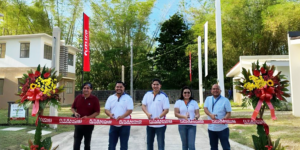
“Agriculture is civilization” – E. Emmons
It is not by declaration of parties to agriculture that is measured. The actual undertakings and clear actions and their corresponding impacts, regardless of the resources brought in is.
Negros has always been known as an active participant on almost all socio-political and economic struggles known to pundits and critics alike. But, if there is one remarkable impact it made, it was on agriculture, as undertaken by the civil society – the church and academe included. The NGOs, academe and the church even private companies with their corporate social responsibilities significantly shifted efforts to agriculture in recognition on the importance of agriculture regardless of motives and purposes.
With clear constitutional recognition, the civil society wasted no time to contribute post-Martial Law period. The principle behind at first, is largely political brought about by the Marcos dictatorship where civil society movement also played a crucial role. Moreover, there is a legal framework that provided spaces to undertake measures consistent to their own institutional mandates.
The succeeding provisions of the 1987 Constitution, clearly recognize the integral and significant roles of the civil society. Article II, Section 23: “The state shall encourage non-governmental, community-based, or sectoral organizations that promote the welfare of the nation.” And, Article XIII, Section 15: “The state shall respect the role of independent people’s organizations to enable the people to pursue and protect, within the democratic framework, their legitimate and collective interests and aspirations through peaceful and lawful means.”
AGRARIAN REFORM AS SOCIAL JUSTICE LAW
The agrarian reform program proved to be an acid test to the (Cory) Aquino administration. Negros was one of the most challenging if not, the most, difficult areas where it was to be implemented. For civil society the struggle for land is embedded in their mandates where they are consciously and deeply involved. It was to ensure that when lands were acquired by the marginalized and underprivileged that, it must be made productive as it is tantamount to their existence as human beings.
This is the reason why civil society in Negros have been zealous in their commitment to pursue agricultural sustainability. While limited to agrarian reform, their participation is a big dent among ARB’s and marginalized. Historical events prove that production practices of the sugar workers (ARB’s) largely revolved around sugarcane and, not, to other crops which are equally if not, more valuable than sugarcane.
The sugar crisis was the main reason in undertaking such a big challenge not only to the civil society but most of all, to the marginalized farmers and the ARB’s.
LEGACY AND PRACTICE
To date, these “legacies” are now integrated in their systems. For its part, the government have accomplished a milestone in terms of scale but, the holistic approach to sustainability integral to social justice, for critics, remain to be subject. The quality of the impact of the government and its instrumentalities as the purveyors of agrarian reform program may have lacked the quality substance. It is for this reason that civil society – was integrated into the equation.
National NGOs and advocacy groups have actively participated in Negros, not only in agrarian reform but, more so, in “alternative economic development” paradigms. This has support of foreign aid agencies for the longest time by pouring out financial, technical and even man power resources. This was mainly a humanitarian commitment.
CSO DENT
Civil society organizations in Negros are of varied motivations and interests or, more aptly – differ in ideologies and orientations where systems and programs of interventions among marginalized communities proportionally differ. As a result, there various failures and challenges and, on the other hand there were also successes.
From training centers of organic agriculture, self-managed sugarcane production, provision of appropriate production and farming technologies and the corresponding training and capability building. Essentially, this is partnership, collaboration and synergy.
To date, the biggest challenges is the farming technologies and the effects of climate crisis on agriculture. On the other hand, ARB’s and small farmers’ mind-set has been re-shaped and have learned new practices and acquired skills and knowledge on agriculture. The actual state of Negros agriculture with the ARB’s and marginalized farmers as major players cannot cope up with the demand to roll out a new active and dynamic local economy given their particular and actual circumstances.
In general, for civil society agricultural productivity, its sustainability and re-generation can only be possible if the mind-set and philosophy is re-created.*







